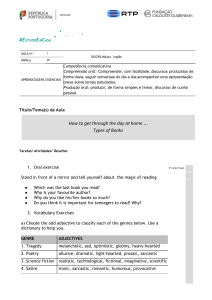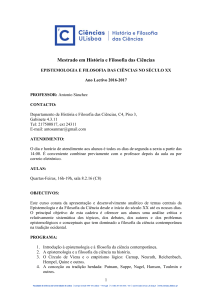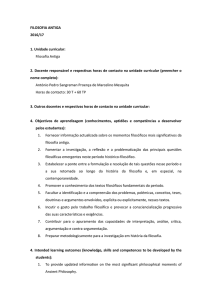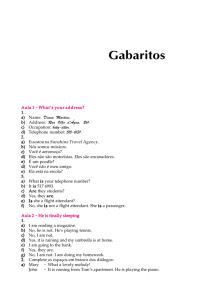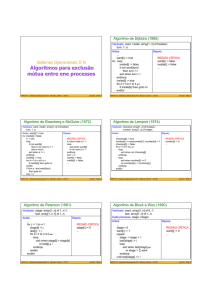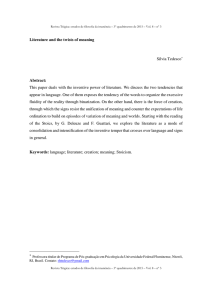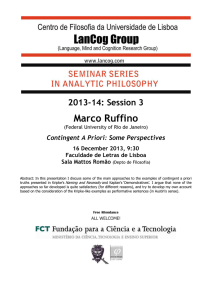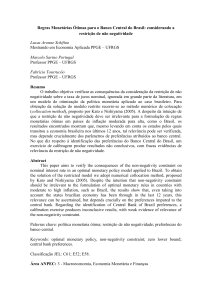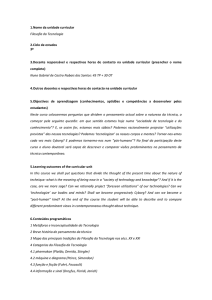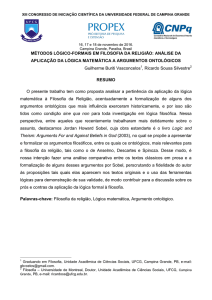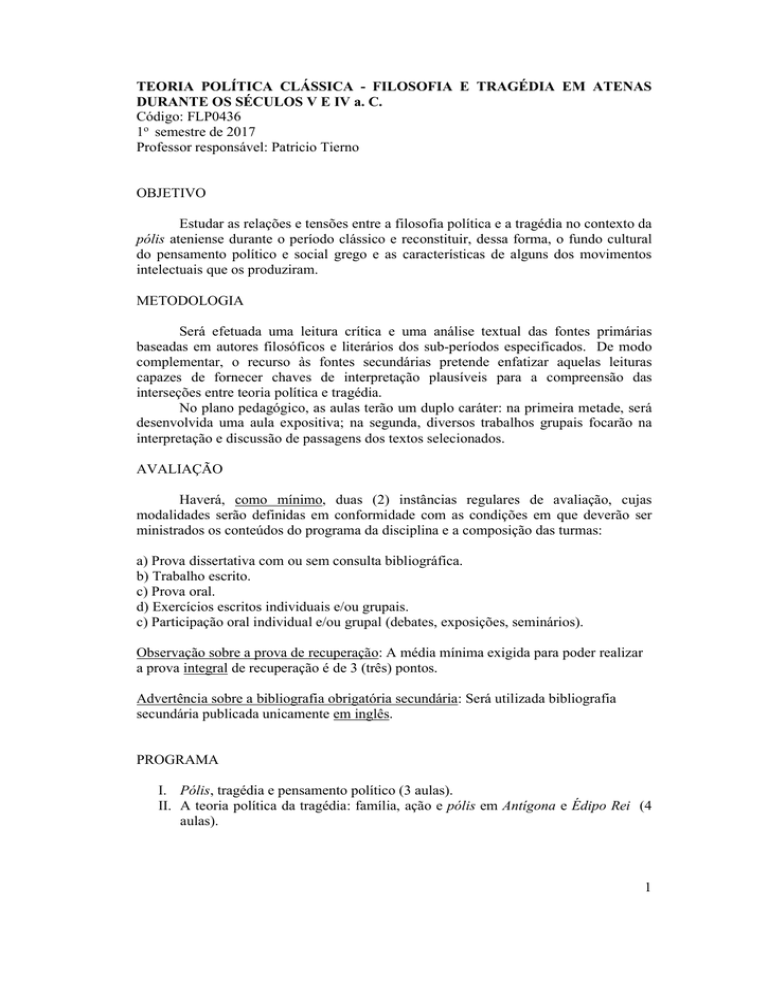
TEORIA POLÍTICA CLÁSSICA - FILOSOFIA E TRAGÉDIA EM ATENAS
DURANTE OS SÉCULOS V E IV a. C.
Código: FLP0436
1o semestre de 2017
Professor responsável: Patricio Tierno
OBJETIVO
Estudar as relações e tensões entre a filosofia política e a tragédia no contexto da
pólis ateniense durante o período clássico e reconstituir, dessa forma, o fundo cultural
do pensamento político e social grego e as características de alguns dos movimentos
intelectuais que os produziram.
METODOLOGIA
Será efetuada uma leitura crítica e uma análise textual das fontes primárias
baseadas em autores filosóficos e literários dos sub-períodos especificados. De modo
complementar, o recurso às fontes secundárias pretende enfatizar aquelas leituras
capazes de fornecer chaves de interpretação plausíveis para a compreensão das
interseções entre teoria política e tragédia.
No plano pedagógico, as aulas terão um duplo caráter: na primeira metade, será
desenvolvida uma aula expositiva; na segunda, diversos trabalhos grupais focarão na
interpretação e discussão de passagens dos textos selecionados.
AVALIAÇÃO
Haverá, como mínimo, duas (2) instâncias regulares de avaliação, cujas
modalidades serão definidas em conformidade com as condições em que deverão ser
ministrados os conteúdos do programa da disciplina e a composição das turmas:
a) Prova dissertativa com ou sem consulta bibliográfica.
b) Trabalho escrito.
c) Prova oral.
d) Exercícios escritos individuais e/ou grupais.
c) Participação oral individual e/ou grupal (debates, exposições, seminários).
Observação sobre a prova de recuperação: A média mínima exigida para poder realizar
a prova integral de recuperação é de 3 (três) pontos.
Advertência sobre a bibliografia obrigatória secundária: Será utilizada bibliografia
secundária publicada unicamente em inglês.
PROGRAMA
I. Pólis, tragédia e pensamento político (3 aulas).
II. A teoria política da tragédia: família, ação e pólis em Antígona e Édipo Rei (4
aulas).
1
III. A teoria política da filosofia: família, ação e pólis em República e Política (5
aulas).
IV. Tragédia, filosofia e teoria política (1 aula).
PROGRAMAÇÃO DAS AULAS
1ª. aula (05 e 06/03). Apresentação.
UNIDADE I
2a. aula ( ). Caracterizações da tragédia grega.
Leituras: Zimmermann, Bernhard, Greek Tragedy. An introduction, Baltimore
& London: The Johns Hopkins University Press, 1993, cap. 1, pp. 1-25.
Hall, Edith, Greek Tragedy. Suffering under the sun, Oxford: Oxford
University Press, 2010, pp. 1-58.
3ª. aula ( ). As bases sociais da tragédia.
Leituras: Hall, Edith, "The sociology of Athenian tragedy", in Easterling P. E.
(ed.), The Cambridge Companion to Greek Tragedy, Cambridge: Cambridge
University Press, 2003, pp. 93-126.
Goldhill, Simon, "The Great Dionysia and Civic Ideology", in
Winkler, John J. and Froma I. Zeitlin (eds.), Nothing to do with Dionysos?
Athenian Drama in its social context, Princeton: Princeton University Press,
1992, pp. 97-129.
4a. aula ( ). A instituição política da tragédia.
Leituras: Hall, Edith, Greek Tragedy. Suffering..., op. cit., pp. 59-103.
Goldhill, Simon, "Greek drama and political theory", in Rowe,
Christopher and Malcolm Schofield (eds.), The Cambridge History of Greek and
Roman Political Thought, Cambridge: Cambridge University Press, 2005, pp.
60-88.
UNIDADE II
5a. aula ( ). O cânone trágico.
Leituras: Aristóteles, Poética.
Woodruff, Paul, "Aristotle´s Poetics: The Aim of Tragedy", in
Anagnostopoulos, Georgios (ed.), A Companion to Aristotle, Malden, MA,
Chicester and Oxford: Wiley-Blackwell, 2009, pp. 612-627.
6a. aula ( ). A compreensão política de Antígona.
Leituras: Sófocles, Antígona.
Lane, Ann M., "The Politics of Antigone", in Euben, J. Peter (ed.),
Greek Tragedy and Political Theory, Berkeley and Los Angeles: University of
California Press, 1986, pp. 162-182.
7a. aula ( ). A atuação política de Édipo.
2
Leituras: Sófocles, Édipo Rei.
Schwartz, Joel D., "Human Action and Political Action in Oedipus
Tyrannos", in Euben, J. Peter (ed.), op. cit., pp. 183-209.
8a. aula ( ). Uma racionalidade política nas tragédias de Sófocles?
Leitura: Ahrensdorf, Peter J., Greek Tragedy & Political Philosophy.
Rationalism and Religion in Sophoclesʹ Theban plays, Cambridge: Cambridge
University Press, 2009, caps. 1 e 3, pp. 9-47 e 85-150.
9a. aula. Prova.
UNIDADE III
10a. aula ( ). A crítica do mito na gênese da cidade.
Leitura: Platão, República, L. II, III e IV.
11a. aula ( ). A cidade justa.
Leitura: Platão, Rep., L. V, VI e VII.
12a. aula ( ). A crítica a Platão no devir da cidade.
Leitura: Aristóteles, Política, L. I, II e III.
13a. aula ( ). O melhor regime.
Leitura: Aristóteles, Pol., L. VII e VIII.
14a. aula ( ). Política e educação.
Leituras: Rose, Peter W., Sons of the Gods, Children of Earth. Ideology and
Literary Form in Ancient Greece, Ithaca and London: Cornell University Press, 1992,
pp. 331-369.
Salkever, Stephen G., "Tragedy and the Education of the Dēmos:
Aristotleˈs response to Plato", in Euben, J. Peter (ed.), op. cit., pp. 274-303.
UNIDADE IV
15a. aula ( ). A teoria política entre a filosofia e a tragédia.
Leituras: Euben, J. Peter, "Introduction", in, Euben, J. Peter (ed.), op. cit., pp. 142.
Arhrensdorf, Peter J., op. cit., pp. 151-178.
16a. aula ( ). Segunda Prova.
PROVA DE RECUPERAÇÃO:
BIBLIOGRAFIA ADICIONAL
Nietzsche, Friedrich Wilhelm, Origem da tragédia, Lisboa: Guimaraes, 1958.
Scodel, Ruth, An Introduction to Greek Tragedy, Cambridge: Cambridge University
Press, 2011.
3
Poole, Adrian, Tragedy: A Very Short Introduction, Oxford: Oxford University Press.
Vernant, Jean-Pierre e Pierre Vidal-Naquet, Mito e tragédia na Grécia antiga, São
Paulo: Perspectiva, 2008.
Green, Richard, Theater in Ancient Greek Society, London and New York: Routledge,
1994.
Hall, Edith, The Theatrical Cast of Athens, Oxford: Oxford University Press, 2006.
Hansen, M. H., The Athenian Democracy in the Age of Demosthenes. Structure,
Principles, and Ideology, Oxford and Cambridge, Mass.: Blackwell, 1991.
Ober, Josiah, Mass and Elite in Democratic Athens: Rhetoric, Ideology and the Power
of the People, Princeton: Princeton University Press, 1989.
Belfiore, Elizabeth, "The Elements of Tragedy", in Anagnostopoulos, Georgios (ed.), A
Companion to Aristotle, Malden, MA, Chicester and Oxford: Wiley-Blackwell, 2009,
pp. 628-642.
Rorty, Amelie Oksenberg (ed.), Essays on Aristotleʹs Poetics, Princeton: Princeton
University Press, 1992.
Beer, Josh, Sophocles and the Tragedy of Athenian Democracy, Wesport: Praeger,
2004.
Euben, J. Peter, The Tragedy of Political Theory. The Road Not Taken, Princeton:
Princeton University Press, 1994.
Euben, J. Peter, Corrupting Youth. Political education, and Political Theory, Princeton:
Princeton University Press, 1997.
Annas, Julia, An Introduction to Platoʹs Republic, Oxford: Clarendon Press, 1991.
Schofield, Malcolm, Plato. Political Philosophy, Oxford: Oxford University Press,
2006.
Kraut, Richard, Aristotle. Political Philosophy, Oxford: Oxford University Press, 2002.
Deslauriers, Marguerite and Pierre Destrée, The Cambridge Companion to Aristotleʹs
Politics, Cambridge, Cambridge University Press, 2013.
Csapo, Eric & William J. Slater, The Context of Ancient Drama, Ann Arbor: The
University of Michigan Press, 2005.
Taplin Oliver, Greek Tragedy in Action, London: Methuen, 1978.
4

